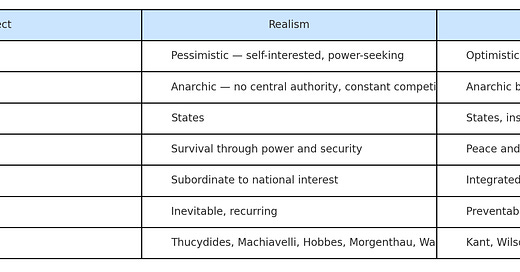It's Not Morality. It's Worldview.
Why we keep misunderstanding Trumpism—a shift in paradigm, not just policy, is the key to changing the game.
After my daily dose of Wordle, Connections, Mini, Strands, and Spelling Bee (in that order—always in that order), I sip my second cup of coffee and scroll through Facebook (yes, I’m in that age group). Without fail, someone at the top of my feed is lamenting the amoral administration and how they can’t understand how their friends or family could possibly support it.
We need to stop thinking this is a fight over morality.
It is not.
It’s a worldview.
And unless we understand that we simply don’t see the world the same way, we’ll keep talking past one another. Worse, we’ll keep fighting the wrong fight. We may flip who’s in power, but the deeper conflict—the one shaping every institution and policy battle—will remain. What we need to change isn’t just the party in charge.
We need to change the paradigm.
When I taught Introduction to World Politics, we always started with the paradigms of Realism and Liberalism. Now before you get ahead of yourself, this isn’t about “liberals” in the contemporary American sense. So go ahead and set that idea aside—for now.
The Realist Worldview: Power, Not Peace
Let’s start with Realism.
Realism is a foundational paradigm in international relations theory that views human nature as inherently violent and the international system as anarchic. Therefore, it argues that rational actors (i.e., states) are in constant pursuit of power and security. Rooted in the ideas of Thucydides, Machiavelli, and Hobbes, modern realism was formalized by scholars like Hans Morgenthau and Kenneth Waltz (Morgenthau, 1948, Waltz, 1979, Mearsheimer, 2001).
In the Realist worldview, war is inevitable—not a question of if, only when. The name of the game is self-help. States don’t cooperate because they’re good; they cooperate only when it serves their interest. Morality is secondary—often irrelevant—compared to the strategic calculations of power. Even in times of peace, states remain locked in a struggle for relative advantage. From this lens, alliances, wars, and political maneuvering are not unfortunate byproducts of a broken system—they are the system.
The Liberal Vision: Rules, Rights, and Cooperation
Liberalism, by contrast, argues that while the international system is still anarchic, cooperation is possible—and peace is not only desirable, but achievable. It emphasizes democracy, trade, and international institutions as tools for reducing conflict and increasing stability. Early thinkers like Immanuel Kant proposed that democracies are less likely to go to war with each other (Kant, 1795). Scholars like Robert Keohane and Joseph Nye later showed how institutions and shared norms help states manage uncertainty, build trust, and resolve disputes peacefully (Keohane & Nye, 1977).
Liberalism sees strength not in domination, but in cooperation. It holds that peace comes not from hoarding power but from building systems—governments, treaties, norms—that make war less likely and justice more possible. Morality here isn’t discarded; it’s embedded in the rules and values that shape our interactions: fairness, transparency, human rights, and mutual accountability.
Trumpism as Realism in Action
Trump and his administration aren’t just Realists in a loose philosophical sense—they are actively dismantling the Liberal world order, starting with American institutions, trade networks, and democratic norms. They’re not doing this just to win the next election. They are doing it because in their worldview, they must have power in order to survive the war they believe is coming.
In their eyes, this is a moral crusade. Strength is virtue. Compromise is weakness. Rules are tools of the naive—or the enemy.
And this is where we get tripped up.
We keep asking: “Don’t they care about fairness? About justice? About the truth?” But those are Liberal questions. If you’re living in a Realist paradigm, those things don’t matter unless they serve survival and power. The battlefield is defined differently. And so is morality.
Competing Moralities
In a Realist world, morality is about duty to the tribe or the nation. It's the ethics of protection: preserve your own, no matter the cost. In a Liberal world, morality is about systems that allow everyone to live with dignity: uphold rights, build trust, respect boundaries.
These aren’t just different policy preferences.
They are different definitions of right and wrong.
And if we want to stop reacting and start reshaping what comes next, we’ve got to stop treating every political disagreement like a clash of good vs. evil and start treating it like what it is: a battle between competing visions of the world.
But first, start naming the world we want to live in.
Quit just reacting to the latest outrage or dissecting every policy proposal. That’s playing defense. Instead, talk to your friends, your family, your neighbors—not about what you're against, but what you're for. What does justice look like where you live? What does safety, dignity, or opportunity feel like in your town, your state, your country, your world? If we don’t start describing it, how can we expect anyone to build it?
The Liberal world order wasn’t perfect. But if we still believe in democracy, accountability, and the possibility of a shared truth—we need to fight for it on its own terms.
Because if we keep trying to win a Realist’s war with Liberal tools, we’re going to keep losing.





very thoughtful and accurate. thank you